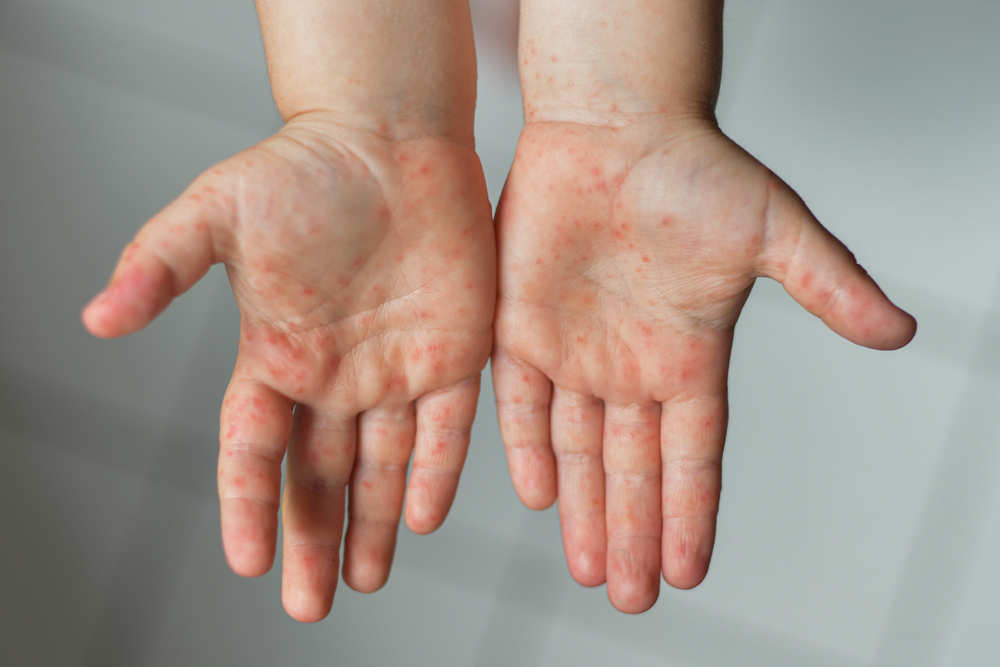
Hand, Foot and Mouth Disease (HMFD) is a generally mild but highly infectious disease that brings about painful mouth sores or an itchy rash on the body, particularly on areas such as the hands, feet, legs or buttocks.
According to the Ministry of Health, It can affect people of all ages but young children, especially those below 5 years of age, are more susceptible as their immune systems are not as strong and they have less antibodies than adults.
HFMD is a viral infection caused by a group of enteroviruses with coxsackievirus A16 being one of the most common viruses that leads to HFMD. Such cases are usually mild and have few complications. However, HFMD cases caused by enterovirus 71 could have more serious complications and may even be fatal.
When and how HFMD occurs
HFMD is present in Singapore all year round. It can be transmitted through direct contact with mucus, saliva, faeces (when changing the diapers of infected young children) and blister fluids of an infected person.
Close personal contact or even indirect contact such as touching an infected doorknob without washing your hands after such contact can result in one contracting HFMD.
Signs and symptoms of HFMD
Common signs and symptoms include fever, sore throat, ulcers inside the mouth or on the sides of the tongue, rash (flat or raised red spots) or small blisters on the palm of hands, soles of feet and sometimes buttocks. The child may experience lethargy and loss of appetite.
However, symptoms may vary among individuals and it is possible that an infected child does not show any HFMD symptoms or only has rashes or mouth ulcers without fever.
Read also: 5 Common Eye Problems in Children to Look Out For
Treatment for HFMD and tips for parents in managing HFMD in children
There is no specific treatment for HFMD in children or adults. To relieve your child’s discomfort, you can provide him with soft foods (such as porridge or pureed fruit) that do not require chewing, ice pops or ice water.
Do avoid food and beverages that could irritate the mouth or throat sores. Your child should take the medication as prescribed by the doctor (such as paracetamol syrup to relieve fever and pain). Encourage your child to drink plenty of fluids and ensure that he gets plenty of rest at home.
As you take care of your child during this period, do ensure that you wash your hands regularly and wear a mask if you need to maintain close contact with him/her.
Prevention of spread of HFMD to others
Do inform the school, kindergarten or childcare your child is in as soon as possible after he has been diagnosed by the doctor so that they can monitor the other children for HFMD symptoms and take the necessary precautions to prevent the spread of HFMD.
A child is required to undergo a mandatory 10-day quarantine if he contracts HFMD and he is most contagious during the course of the illness. You can get your child to practise the following, as advised by HealthHub, in order to protect others, especially family members, from being infected:
- Practise good hygiene such as washing the hands regularly, especially before eating and after visiting the toilet
- Cover the mouth when he coughs or sneezes
- Stay indoors and away from public spaces
- Avoid close contact, including his family members
- Do not share food and drinks, as well as personal items such as toothbrushes, eating utensils, towels and clothes
It is useful to note that toys or appliances that are contaminated by nasal or oral secretion are cleaned and disinfected before they are used again.
HFMD in adults
Although HMFD generally occurs in children, it is possible for adults to contract the disease too, especially when caring for them. If you encounter HFMD symptoms, do consult your family doctor who will do a physical check for rashes or sores to determine if you have contracted the condition.
Adults can manage HFMD in much the same way as HFMD in children. Ensure that you drink enough fluids and get enough rest and employ the above measures to prevent the spread of HFMD.
What about breastfeeding mums who have contracted HFMD?
According to an interview with Dr Chris Cheah, Deputy Director, Communicable Disease, Health Promotion Board, breastfeeding mums can continue to breastfeed their children even if they have contracted HFMD as the virus cannot be transmitted through breastmilk.
Read also: Common Childhood Illnesses Every Parent Must Know
We hope that this article has helped you to better understand HFMD and the things to look out for when your child goes through an episode. All the best for a speedy recovery for your little one – and do take care of your health too!























